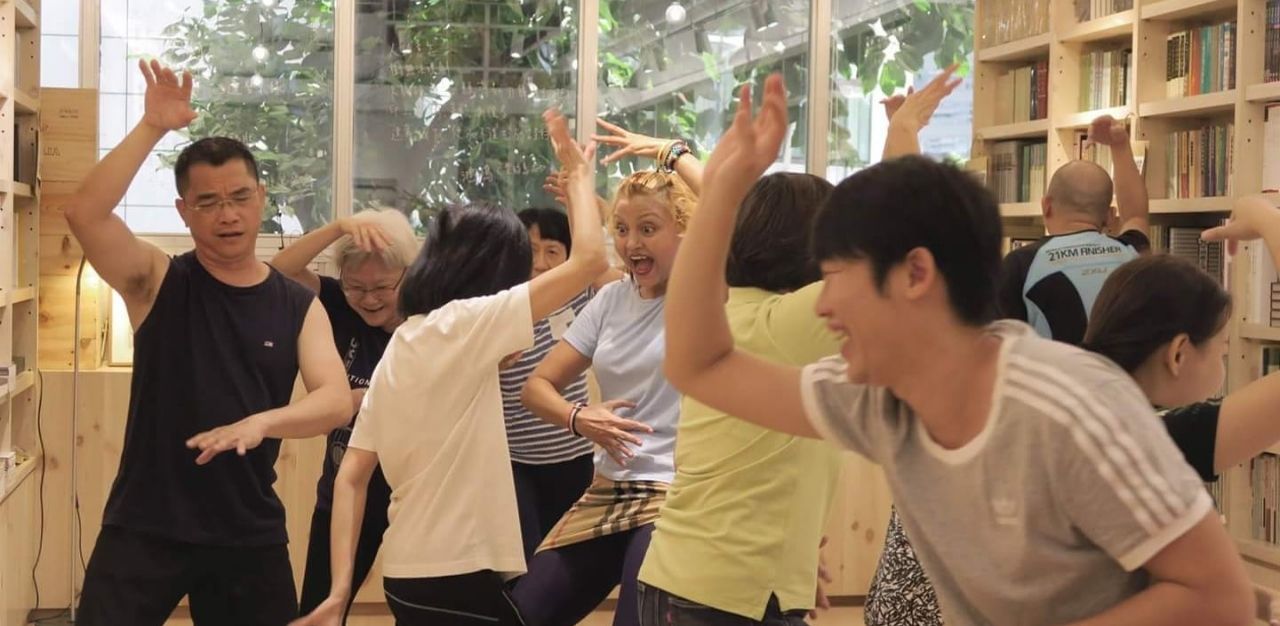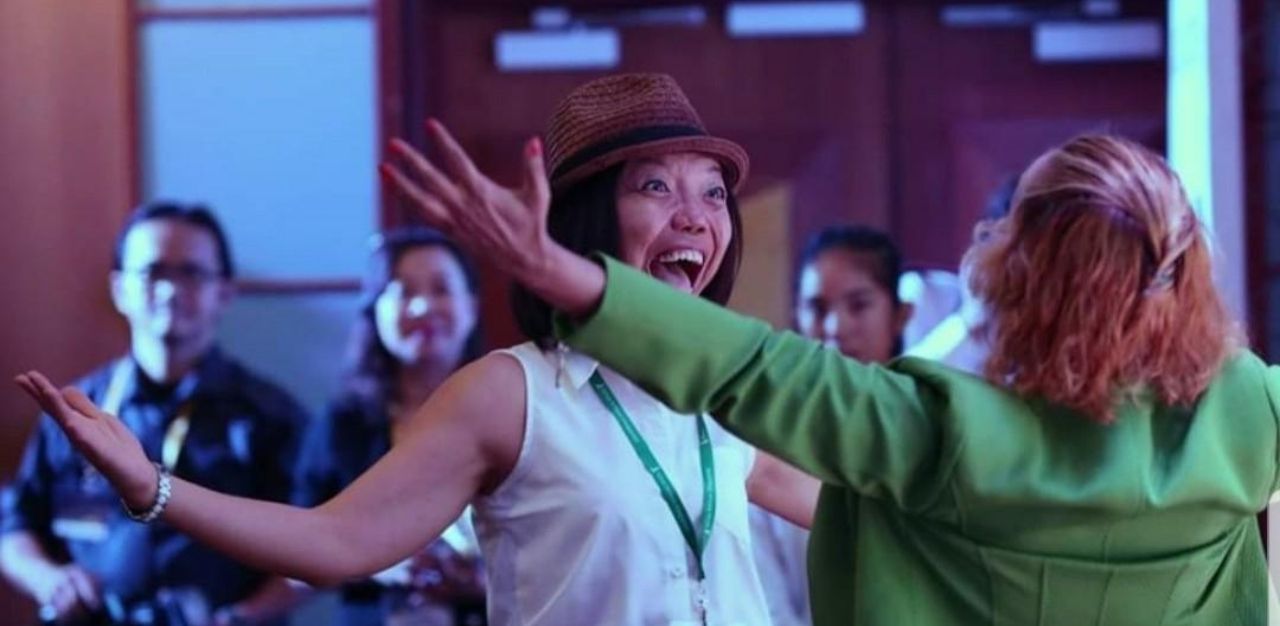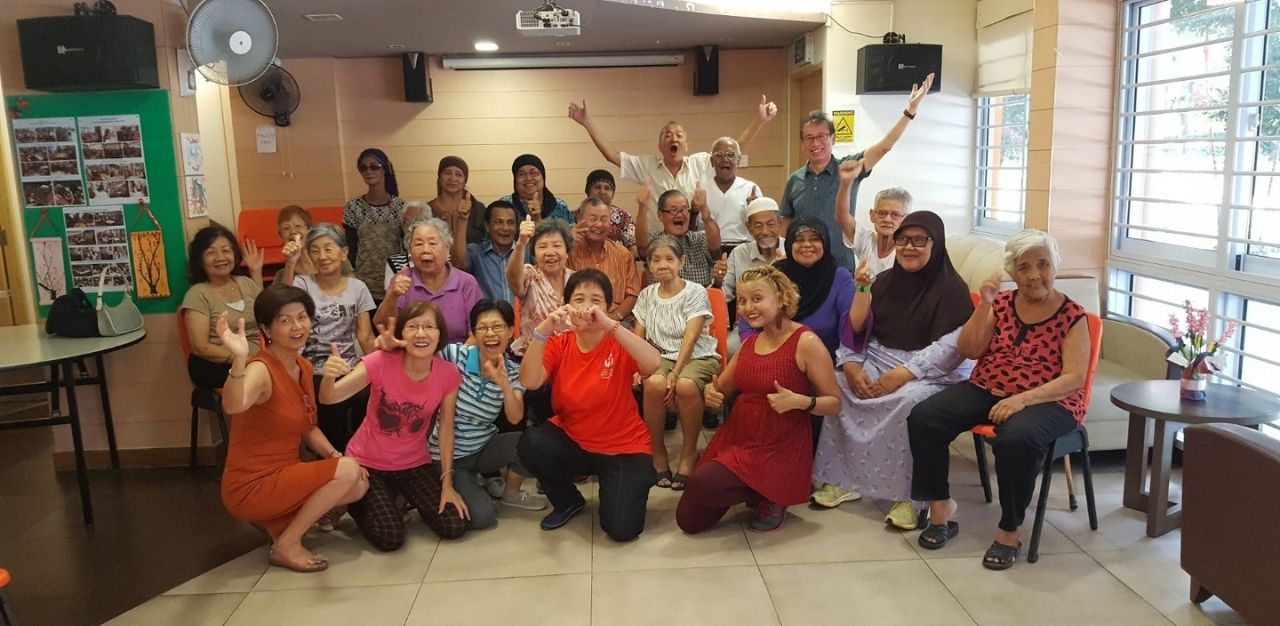When Ms. Suchi’s mother died eight years ago, her whole world collapsed.
“I was in a very dark space,” she says. “I was crying for hours and dragging my feet to work. [After work], I would come back and be in bed, mostly crying. I didn’t even have the mood to move, or shower or brush my teeth… I was also having suicidal thoughts.”
While it might have been the lowest point in her life then, it was also a watershed moment. In the one year after her mother’s death, the distraught Ms. Suchi embarked on a mission of self-realisation and discovery. She spent the duration working on different aspects of herself — exploring manifestation, energies and hormones alongside anger and grief management.
It was during this time that she had her first encounter with laughter exercises through a local laughter coach. She was hooked instantly.
For the uninitiated, Ms. Suchi explains that laughter exercises typically involve light stretching, breathing exercises, and the key segment: laughter, where participants engage in laughing aloud using their abdominal muscles for 15 to 20 minutes at a time. These laughs can revolve around themes developed by the laughter coaches to induce laughter.

Taking exercises from laughter coaches around the world, Ms. Suchi developed her own series of 100 laughter drills. Compiling her own exercises and those developed by other laughter coaches, including those with humorous names like roti prata laughter and teh tarik laughter, Ms. Suchi is now in the business of spreading happiness and positivity every day.
This is a far cry from the despondent person she was over eight years ago.
“[Now,] I get a lot of compliments on my energy,” she says. “I come across as a very energetic person, really positive.”
Today, Ms. Suchi is revelling in her career as a laughter coach, having left her previous life as a preschool principal far behind. “I feel so happy being a laughter coach and spreading laughter around the world, making people happy, and making them understand the importance of being happy,” she says.
“It gives me a sense of fulfillment and achievement,” she adds. “I don’t regret it. Not a single bit.”
With over 150,000 followers on LinkedIn, Ms. Suchi says she is just getting started on her mission.
“I want to be known worldwide as a laughter coach. Right now, I’m only helping a handful [of people]. I want to be able to help millions,” she says.
Checking in on her ambitious plans, TheHomeGround Asia sits down with her to uncover the secret behind her boundless energy and positivity, delve into her journey of becoming a laughter coach, and her key to happiness.
[NOTE: This interview has been edited for clarity and length.]
Ms. Suchi: It was eight years back when I lost my mother to cancer, and my whole world collapsed. I was distraught. I was seeking answers, and there was no peace.
That’s where it all started. It was the universe guiding me and my mummy’s spirit helping me as an angel. I see [my mummy’s death] as a turning point in my life. When she left this world, I had an awakening. I [realised] I am not born just to pay my bills and die. What about my impact on people? What about my legacy? All these questions just popped up and I was shakened. Like, ‘Oh my god, what am I doing? I’m just going to work, coming back, not really having any impact on people around me.’
[After her death,] I gave myself one year to work on my self development, understand my body’s energy, and learn more about happy hormones.
Then, I came across a local laughter coach and picked up some exercises from him. I used them as tools later to conduct sessions at senior activity centres (SACs) and migrant workers’ dormitories. That gave me a lot of happiness. I felt like I had something to give to the world. I also realised that when I’m conducting those exercises, I feel really fulfilled.
There are some groups in other parts of the world conducting [laughter] exercises. People come, laugh together, and then they go back. Of course, they will get a dosage of happy hormones and endorphins, but within, they might still be sad, upset, low, [or] depressed. I was not satisfied [with] just conducting the exercises. That was when I went to study brain development, happy hormones and energy; and how can I help people change their [level of] energy from inside out and not just on the surface.
THG: Tell me more about laughter therapy. How did you develop your programme?
MS: I picked up exercises from different laughter coaches, but I didn’t stop there. When people laugh, they only get endorphins. [So I thought,] what can I do in order for people to get oxytocin during my therapy sessions? I read that when we compliment each other, when we hug, or hold hands, our brain releases oxytocin, the love hormone, and we feel loved. So I weaved it [into my sessions]. Then, how do I get people to get dopamine? Alright, now let’s do this for the dopamine.
I wanted to do inside work, not just on the surface. I realised that just laughing for 15 to 20 minutes will help people get [a] dosage of happy hormones and endorphins, but what about the other hormones?
So I weaved those in, and I designed a laughter [exercise for each of these hormones]. I brought in progressive muscle relaxation exercises, [and] added positive affirmations [to be said] aloud – “I am happy, I am awesome, I am power”.
I also play soothing piano music during the progressive muscle relaxation [at the end of the session]. I wanted to have that blissful experience where [participants] either lie down or sit up straight, and I use my voice for progressive muscle relaxation. I wanted them to experience all of it, so that when they go back home, they are working from the best version [of themselves].
THG: Can you share more about the types of laughter exercises you have developed?
MS: I have 100 types of exercises. So the very first one, for example, is handshake laughter. You extend your hand in front of you, and then you go ‘ehhhhh’, shake [the other person’s hand], and then laugh aloud. You have to open your jaw wide, inhale oxygen, and let go. It’s all from stomach, belly laughter. We also have roti prata laughter, teh tarik laughter and peekaboo laughter. We have birthday laughter, where you blow out candles then [laugh aloud]. Credit card laughter, where you see your [imaginary credit card] bill, you open it, and you laugh. There’s jungle king laughter, horse riding laughter, Tarzan laughter, and three ages laughter – baby, young person and old person. These are the types of laughter exercises.

THG: Have you encountered any sceptics in your career thus far? How do you respond to them?
MS: I have come across people who didn’t want to believe in [laughter exercises]. They wanted to make fun of me. They didn’t want to cooperate with me during the sessions.
[There was a man who asked], ‘Somebody has died at my place, and you want me to laugh?’
My answer was this – when you are grieving and mourning for somebody who is dead, you are also taking one step closer to death. Your time on this earth is really limited and short. You might not be around tomorrow. I’m not cursing you or being negative, but that’s the reality of life. Whether you want to live the rest of your life grieving for the person who has left or loving and taking care of being responsible for the people who are alive, it’s your choice. I have seen people grieving and mourning for 9, 10 years. The loved ones who are alive and with them are not well taken care of because they are [still] mourning and grieving for the person who is gone.
Then, he thought about it for a while. And when we were leaving, he actually said, “I’m going to walk to my room laughing”.
THG: What would you say is the most fulfilling part of your journey?
When I help wean people who are on medication for depression off the pills. They say, “Because of you, I need not take my medicine”. That’s really fulfilling to me. [Another part is] when people come in with knee pain or shoulder pain, or other slight body pains for laughter exercises, and the pain disappears. Number three will be people who come with low energy, perhaps after work, or maybe they didn’t have a good day and are feeling sad for some reason. After the session, they feel like they can go dancing with their wives. They feel energetic. Those are really rewarding for me. I’m also able to save lives through my work. To date, I’ve saved 33 people from attempting to take their lives.
ME: How has being a laughter coach changed your life?
MS: I get paid.. I am a freelancer and I receive invitations for speaking in conferences, community clubs, schools, colleges, and universities. I’m able to uplift spirits. It has changed my life, because I understand myself better. Then there is the attention from the media. I’ve been getting a lot of it. Finally, the growth in the number of followers. I have 150,000 on LinkedIn and 2.8 million views on Google Map. I’m being noticed, appreciated and rewarded. I get a lot of sense of fulfilment and I am happier than before. I’m able to help people. These are all the positive changes I have made since I became an entrepreneur.
THG: Are there any touching moments in your career that stood out to you?
MS: There was an elderly man at the Senior Activity Centre and he was standing a little further away. Maybe he was having a bad day or something. I could see it on his face. He was also a little teary. He started to move closer during my session and sat in an empty chair and joined in. After the session, he came up to me and said that he was really emotional as his loved ones didn’t treat him well. But after attending the session and going through the relaxation exercises and overall messages, he said that the pain in his heart is gone. That’s something I remember very clearly.
THG: You also work a lot with vulnerable communities. Tell us more about the work that you do with them.

MS: Every year, I spend my birthday at MINDS [Movement for the Intellectually Disabled of Singapore]. I don’t call them disabled, I call them specially-abled. On my birthdays, I would get cakes, cupcakes and spend time with them. I take them for walks to uplift their spirits.
Otherwise, I will be at the migrant workers’ dormitories. Now, these migrant workers come from all over the world and they are away from their families. They are very stressed most of the time due to their [heavy] workloads, living conditions, and other worries. Although our leaders are doing quite a lot for them, they still feel lonely and homesick. So my way of giving back is to be there for an hour to spend time with them. Sometimes they don’t need much. They’re not asking for a lot, just someone to listen to them. I do that for migrant workers regularly.
I also visit elderly homes and Senior Activity Centres where I sit with [the elderly], help them with the activities they’re doing, and distribute chocolates. Sometimes, I conduct clapping exercises for them.
THG: Why do you have a heart for these specific communities in particular?
MS: They’re the least-loved. You need to take time out for them to make sure they feel appreciated and loved. When I do that, I get a sense of achievement and fulfilment. I feel at peace when I do this, because I see changes in them after spending time with them. And that’s important to me, that if I’m able to make a positive difference in one person’s life, I feel that my stay on this earth is worthwhile.
THG: What’s your secret to happiness?
MS: Never, ever leave the keys of your happiness in someone else’s hands. There are all sorts of people on this planet. We are wired very differently. So once you understand that the person [you’re] not getting along with is different from [you], accept that. Accept the person, do not try to change them. But take control over how [you] respond; take charge of that. I do not let anyone play with my mind. People have all sorts of drama. I have learned not to get affected, so the keys of my happiness are always in my hands.
That does not mean that people don’t treat me badly. There are a handful who are not nice to me, but I always bless them in my heart. I say, ‘Thank you so much. This is an experience. And I send good energy to you and thank you for this experience.’ Then, I let go.
You are not going to please the whole world. There are people who have decided to be unhappy, and that’s okay. It’s their choice.
I continue to take charge of how I respond to them. I continue to take charge of my happiness, and I don’t allow anyone to play with my mind. That’s the secret [to] my happiness.
THG: Is there a philosophy or a mantra that you live by?
MS: I take the best from different philosophies, and apply them. Because sometimes, reading doesn’t work. People read, they forget. What I do is, I read something nice and I apply it to myself. Then, it becomes a part of me. For example, gratitude. People talk about being grateful, but in the next moment, they talk about what’s not good in their lives. So are they really practising gratitude?
THG: What kind of impact do you hope to leave on the people you encounter?
MS: I want people to remember me as somebody who’s very energetic, very cheerful, somebody who is able to listen to them empathetically, who is positive in thinking, and who has changed their lives in a good way.
Join the conversations on TheHomeGround Asia’s Facebook and Instagram, and get the latest updates via Telegram.














